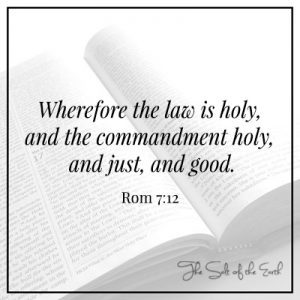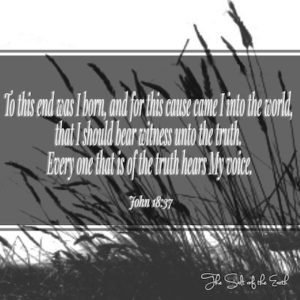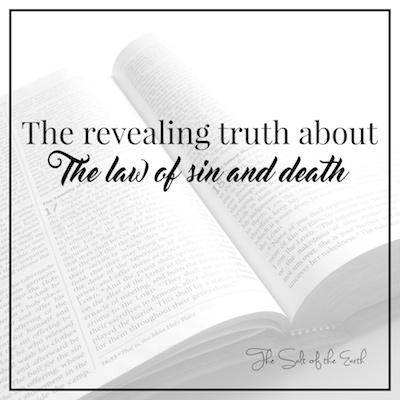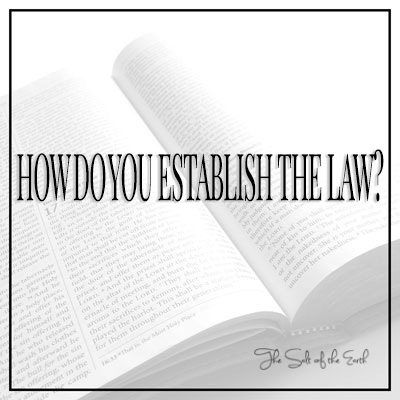In Hebrews 7:12, it is written that a change of priesthood means a necessary change of law. But what does this change of law in the change of priesthood mean? How is the law changed? Does the law, which God gave to Moses, no longer apply? Did Jesus abolish the law? Or does the Mosaic law still apply to Christians? What is the law of the Kingdom of Heaven, kung saan si Jesucristo ay Hari at naghahari? Which law applies in the New Covenant and should Christians obey?
The Levitical priesthood and the law of Moses in the Old Covenant
In the Old Covenant God had appointed Moses and Aäron from the tribe of Levi, to deliver His people from slavery and the reign of Pharaoh and lead them to the promised land.
God revealed Himself through the visible signs and wonders and took His people by the hand and delivered His people and led them to the promised land.
While they were in the wilderness, God made His nature and His will known, by giving His law to Moses. Through the law, the will of God was made known and therefore sin was revealed. This law belonged to the covenant between God and His people Israël.
God appointed Aaron as high priest and his sons as priests and so the Levitical priesthood was instituted.
Sa Lumang Tipan, the law of Moses applied and the people lived under the Levitical priesthood and animal sacrifices were made and the blood of animals made a temporal atonement for the sins and iniquities of the people(Basahin mo rin: ‘Ano ang lihim ng batas?’ and ’What is the difference between the sacrifices of animals and the sacrifice of Jesus Christ?’)
Although God had chosen His people, His people belonged to the generation of fallen man (matanda na ba), whose spirit is dead.
God’s people were soulish and since they could only walk after the flesh, God gave them commandments, (sacrificial and food) laws, rituals, precepts, and feasts, which applied to the flesh of the carnal man.
Therefore the law of Moses with all its commandments, laws, rituals, precepts, feasts, atbp. was meant for the old man, who is unspiritual and carnal and can only walk after the flesh, in which sin and death reign.
The law of sin and death reigns in the flesh of the old man
Because of the fact, that the sinful nature reigns in the flesh, the flesh doesn’t love God, but loves itself. The flesh is prideful, mga mapanghimagsik na, unfaithful, walang pananampalataya, selfish, jealous, greedy, and unforgiving and wants to lie, steal, cheat, covet, gumawa ng pangangalunya, pakikiapid, diborsyo, hate, kill, atbp.
Therefore God commanded in the law of Moses, ‘Thou shalt not…’ (Basahin mo rin: ‘Why did God say, thou shall not… and why did Jesus say, thou shall…? at ‘Ang nagsisiwalat na katotohanan tungkol sa batas ng kasalanan at kamatayan‘)
A New Covenant and a change of priesthood
Kung gayon ang pagiging perpekto ay sa pamamagitan ng Levitical priesthood, (sapagkat sa ilalim nito ay tinanggap ng mga tao ang batas,) what further need was there that another priest should rise after the order of Melchisedec, at hindi matatawag ayon sa utos ni Aaron? Para sa pagkasaserdote na binabago, doon ay ginawa ng pangangailangan isang pagbabago din ng batas. For he of whom these things are spoken pertaineth to another tribe, na kung saan walang taong nagbigay ng pagdalo sa altar (Mga Hebreo 7:11-13)
The law of Moses was part of the Old Covenant, which was meant for God’s carnal people. But God’s carnal people could not keep the law of God. God’s people were prideful, rebellious and exalted themselves above the law of God and made their own laws and committed idolatry and lived like the pagan nations, and so God’s people committed spiritual adultery and broke the covenant with God (a.o. Jeremias 3:7-11; 11:10, Ezekiel 44:6-8, Hosea 8:1, Mga Hebreo 8:9).
The people didn’t love God and therefore they didn’t listen to His voice and didn’t keep His commandments.
But God knew all this beforehand. God knew that the Old Covenant wouldn’t stand, because of the weakness of the flesh.
Therefore God prophesied at the beginning of creation after the fall of man about the coming of the Seed that would bruise the head of the devil (Basahin mo rin: ‘What does it mean the head of the devil bruised because the heel of Jesus was bruised?' at 'Waiting, for the promise of the Messiah’)
And this promise of God was fulfilled, nang si Jesucristo, ang Anak ng Diyos at ang Buhay na Salita, came to the earth to heal what was broken and restore the relationship between man and God and the position of man on earth through His perfect redemptive work (Basahin mo rin: ‘What is the true meaning of the cross?’, ‘Anong uri ng kapayapaan ang dinala ni Jesus sa lupa?‘ At ‘Ipinanumbalik ni Jesus ang posisyon ng bumagsak na tao‘)
Jesus didn’t belong to the tribe of Levi and was not born of the seed of Levi, but Jesus belonged to the tribe of Judah and was born of the Seed of God (Basahin mo rin: Si Jesus ba ay ganap na Tao?)
After the crucifixion and resurrection from the dead, Jesus stayed for forty days on earth, teaching His disciples. After forty days Jesus was caught up in a cloud and ascended to heaven and took place at the right hand of the Father on the throne of mercy (mercy seat) in the Holy of Holies and became both High priest and King after the order of Melchizedek (Basahin mo rin: ‘Ano ang pagkakasunud sunod ni Melquisedec?).
The change of priesthood meant a change of law
Through Jesus Christ, a New Covenant was instituted, which is sealed with His own blood. The change of covenant and the change of priesthood also meant a change of law.
The Levitical priesthood and the Mosaic law were part of the covenant between God and His carnal people Israel and as a sign the circumcision in the flesh.
Lahat ng tao, who belonged to the house of Israel and was circumcised in the flesh lived under the Levitical priesthood and had to keep the law of Moses with all its commandments, precepts, (sacrificial and food) laws, rituals and feasts.
The Levitical priesthood and the law of Moses were meant for the old man, who is carnal and in whom the sinful nature reigns, and not for the new man, who had become a new creation in Christ and in whom God’s nature reigns.
In the Old Covenant God made His will known to His carnal people Israel by giving the law and in the New Covenant God made His will known to His people by giving His Holy Spirit, whereby His laws are written in the mind and heart of the new man (Basahin mo rin: ’Ano ang nangyari 50 days after Passover?)
Through regeneration in Christ, the old man dies
Dahil nga sa, mga kapatid, katapangan na pumasok sa pinakabanal sa pamamagitan ng dugo ni Jesus, Sa pamamagitan ng bago at buhay na paraan, na Kanyang inilaan para sa atin, sa pamamagitan ng tabing, na ang ibig sabihin ay, his flesh; At pagkakaroon ng Mataas na Saserdote sa bahay ng Diyos; Lumapit tayo nang may tunay na puso nang may lubos na katiyakan ng pananampalataya, na ang ating puso ay nawisik mula sa masamang budhi, at ang ating katawan ay hinugasan ng dalisay na tubig (Mga Hebreo 10:19-23)
By faith in Jesus Christ, pagsisisi, and regeneration in Christ, man identifies himself/herself with the death and resurrection of Jesus Christ, whereby the old man (laman) dies and the new man (espiritu) is raised from the dead.
The old man lays down his life symbolically through the baptism in water. In baptism, the old man dies, and therefore the law of sin and death, which reigns in the flesh of the old man dies. For by the death of the flesh man is loosed from the law, which reigns in the flesh (Basahin mo rin: ‘Ano ang bautismo?)
Through the death of the flesh, the law of sin is abolished and sin and death no longer reign in the life of the person, who has become a new creation in Christ.
But although the law of sin and death no longer reigns through the death of the flesh, the will of God and the nature of God remain unchanged.
This means that the moral commandments (laws) that represent the nature and the will of God still apply in His Kingdom and in the New Covenant.
Through regeneration in Christ, the new man is raised from the dead
Masdan, the days are coming, declares the Lord, when I will make a new covenant with the house of Israel and the house of Judah, not like the covenant that I made with their fathers on the day when I took them by the hand to bring them out of the land of Egypt, My covenant that they broke, though I was their husband, declares the Lord. For this is the covenant that I will make with the house of Israel after those days, declares the Lord: I will put My law within them, and I will write it on their hearts. And I will be their God, and they shall be My people. And no longer shall each one teach his neighbor and each his brother, sabi nga, ‘Know the Lord,’ for they shall all know Me, from the least of them to the greatest, declares the Lord. For I will forgive their iniquity, and I will remember their sin no more.” (Jeremias 31:31-34)
For this is the covenant that I will make with the house of Israel after those days, sabi ng Panginoon; I will put My laws into their mind, and write them in their hearts: and I will be to them a God, and they shall be to Me a people: And they shall not teach every man his neighbour, and every man his brother, sabi nga, Know the Lord: for all shall know Me, from the least to the greatest. For I will be merciful to their unrighteousness, and their sins and their iniquities will I remember no more. In that He saith, A new covenant, He hath made the first old. Now that which decayeth and waxeth old is ready to vanish away (Mga Hebreo 8:10-13)
And every priest standeth daily ministering and offering oftentimes the same sacrifices, which can never take away sins: But this man, after he had offered one sacrifice for sins for ever, sat down on the right hand of God; From henceforth expecting till his enemies be made his footstool. For by one offering he hath perfected for ever them that are sanctified. Whereof the Holy Ghost also is a witness to us: for after that he had said before, This is the covenant that I will make with them after those days, sabi ng Panginoon, I will put my laws into their hearts, and in their minds will I write them; And their sins and iniquities will I remember no more. Now where remission of these is, there is no more offering for sin (Mga Hebreo 10:11-18)
Through the resurrection of the spirit from the dead and the indwelling of the Holy Spirit, you have received God’s nature, and His will is written in your mind and your heart. You were dead, but because of the resurrection in Christ from the dead, you have been raised from the dead and entered the life in Christ. Now a new law reigns in your life, namely the law of the Spirit in Christ Jesus which is the law of life.
The law of the Spirit in Christ Jesus no longer commands, “thou shalt not…”, because the flesh with all its sinful lusts and desires no longer reigns in you because the flesh is dead and no longer lives.
But the law of the Spirit in Christ says, “thou shall…”, because the spirit who was dead, has become alive in you and reigns in you.
The new man has God’s nature and loves God with all his heart, kaluluwa, isip isip, and strength and loves his neighbor as himself. Therefore the new man submits to God and speaks the truth and is obedient, loyal, tapat na, grateful, satisfied, patient, selfless, forgiving, and walks in love (the righteous love of God).
By walking after the Spirit in submission to Jesus Christ; the Word in the will of God the new man shall fulfill the law, tulad ni Jesus, Who didn’t come to abolish the law but to fulfill the law (Mateo 5:17, Mga Taga Roma 3:31).
The law of God, which represents His will and has reigned from the beginning in the Kingdom of Heaven, shall always reign in the Kingdom of Heaven.
The fall, the covenant, the coming of the law of Moses, and the coming of Jesus Christ and His redemptive work have not changed anything about that. The only thing that changed is the creation of God and the status and the position of man (Basahin mo rin: ‘Maaari mo bang gamitin ang isang sirang mundo bilang isang dahilan?).
The will of God and His nature shall never change and therefore His commandments, which are the same commandments of Jesus, shall not change. God’s Word stands forever (a.o. Mga Awit 119:89, Isaias 40:6 (Basahin mo rin: ‘Ang mga utos ng Diyos at ang mga utos ni Jesus‘)
The law of the Spirit of life reigns in the new man
Now the God of peace, that brought again from the dead our Lord Jesus, that great Shepherd of the sheep, through the blood of the everlasting covenant, Make you perfect in every good work to do his will, working in you that which is wellpleasing in His sight, sa pamamagitan ni Jesucristo; to Whom be glory for ever and ever. Amen (Mga Hebreo 13:20-21)
Kaya nga ngayon ay walang kahatulan sa kanila na nasa kay Cristo Jesus, na hindi lumalakad ayon sa laman, ngunit pagkatapos ng Espiritu. Sapagka't ang kautusan ng Espiritu ng buhay kay Cristo Jesus ay nagpalaya sa akin sa kautusan ng kasalanan at kamatayan. For what the law could not do, in that it was weak through the flesh, God sending His own Son in the likeness of sinful flesh, and for sin, condemned sin in the flesh: That the righteousness of the law might be fulfilled in us, na hindi lumalakad ayon sa laman, ngunit pagkatapos ng Espiritu. For they that are after the flesh do mind the things of the flesh; but they that are after the Spirit the things of the Spirit. Sapagkat ang maging makamundong pag iisip ay kamatayan; ngunit ang maging espirituwal na pag iisip ay buhay at kapayapaan (Mga Taga Roma 8:1-6)
The new man has been made free in Christ and no longer lives in bondage to sin and death, but is raised from the dead and delivered from the power of darkness by the power of God and lives in bondage to Jesus Christ; the Life in the light.
Therefore the new man shall no longer obey the devil and death and do the works of the flesh and bear the fruit of the death, which is sin. If someone keeps bearing the fruits of death, which is sin, then this means that the death still reigns in the life of the person and the person still lives as the old creation. Because the new man shall submit to Jesus Christ and obey Jesus Christ, ang Salita, at ang Buhay, and bear the fruit of the Spirit.
The new man no longer lives as the old creation after the flesh in the Old Covenant under the Levitical priesthood, where the law of Moses reigns and the person has to keep all the sacrificial laws, food laws, rituals, feasts, atbp., which are meant for the old man. But the new man lives in the New Covenant under the Messianic Priesthood, where the law of the Spirit of in Christ Jesus reigns and the new man lives as priest and reigns as king and therefore walks holy in the authority of King Jesus and the power of the Holy Spirit in the will of God on earth.
'Maging asin ng lupa'






